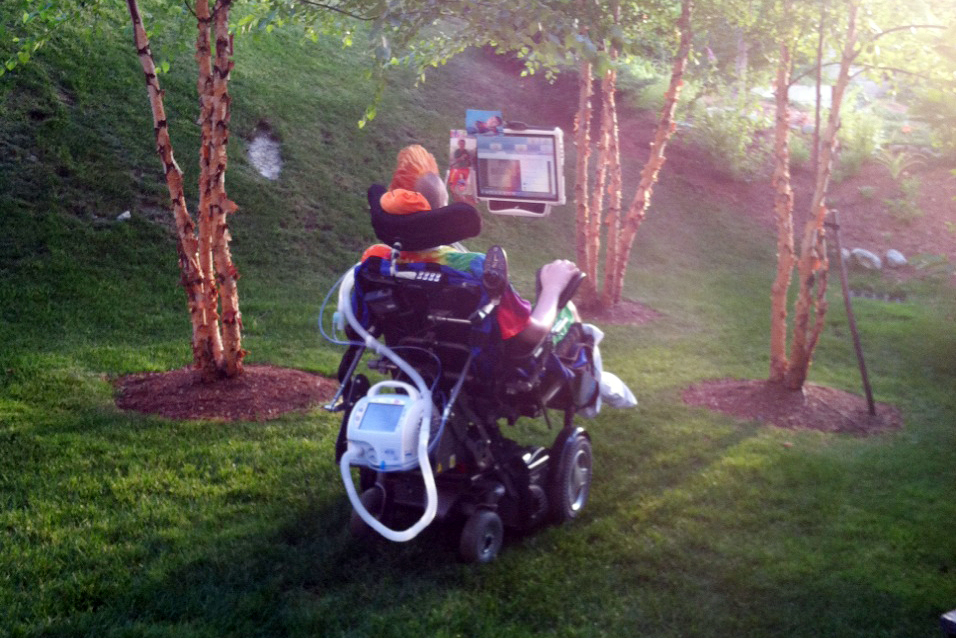
I wake up almost every morning having dreamed of food. I watch Goodfellas just for the food scenes. My kingdom for a Big Mac. Taco Bell commercials are thought-provoking to me. But the fact of the matter is, I can’t eat. Or run or walk or even move my legs or arms. I’m lying flat in a bed and typing this with my pupils, which, along with my brain, are among the last functioning parts of my body.
I was diagnosed with ALS at 30. I’ve been filming every angle of this disease for the past 10 years. In October, I’ll turn 40. Damn, where does the time go? I started shooting a film as a f-ck you to ALS. My cinematographer, Ian Dudley, has this old Russian 35-mm camera with these amazing lenses. It was important to me that we get it down on film because ALS is a very physical disease. If it was going to steal my being, I would replace it with celluloid.
When I stop to think of the hell I’ve been through, I can’t believe I’m still alive. When I think of all the people out there with no support, my heart floods. Often I break down crying. I’m lucky because I get to live in one of the best ALS communities in the country, the Leonard Florence Center for Living in Massachusetts, the nation’s first ALS residence. Besides the daily love and help of the staff here, two things keep me going: my son, who is 6 and lives far away from me in Florida, and finishing my documentary.
There’s a bright side to ALS. I know that sounds twisted, but in a lot of ways ALS saved my life. Having a fatal disease turns the odometer of the soul back to zero. It reverses any evils done or done to you. It’s the perfect disease. Everyone should experience what it is like to have ALS for a day. And maybe they are, with this #ALSicebucketchallenge that has swept the nation. I call them “awareness baptisms.” It’s freaky when the disease that is slowly killing you becomes an overnight trend. By freaky I mean cool. It’s a way for people to connect with something bigger than themselves, to wash themselves in the fear that they might be next.
I live in a bubble. When it comes to ALS, I make it a point to not remember the gory statistics. ALS has not had any significant drug approval in the 70 some years since Lou Gehrig gave his “Luckiest Man on the Face of the Earth” speech. So I lie here, hoping to see my upcoming 40th birthday, praying to the black dot on my ceiling, unable to even masturbate, dreaming of the outside world.
To have ALS these past weeks has been to be a sort of disease celebrity. Even if you’ve been doomed with the fatal diagnosis, the #ALSicebucketchallenge got you tons of Facebook tags and notifications. For a minute, everything is awesome here in ALS land.
Yet why do I still feel such an impending sense of dread? (Medical marijuana usually relieves my anxiety, but I haven’t had any in months because you can’t roll a joint with your eyelids.) I think I’m feeling dread because this ice-bucket thing is so successful, and I’m scared that it will end. It has to. The collective American attention span dictates that it must. This desperately needed attention will fade. Then where will we be?
Thanks to Michele Dupree, Doug Pray and Karen Ingram for their input.
Patrick O’Brien is a filmmaker who was diagnosed with ALS at 30 years old and decided to embark on sharing his life story in his feature-length documentary to be released later this year.
More Must-Reads from TIME
- Why Biden Dropped Out
- Ukraine’s Plan to Survive Trump
- The Rise of a New Kind of Parenting Guru
- The Chaos and Commotion of the RNC in Photos
- Why We All Have a Stake in Twisters’ Success
- 8 Eating Habits That Actually Improve Your Sleep
- Welcome to the Noah Lyles Olympics
- Get Our Paris Olympics Newsletter in Your Inbox
Contact us at letters@time.com